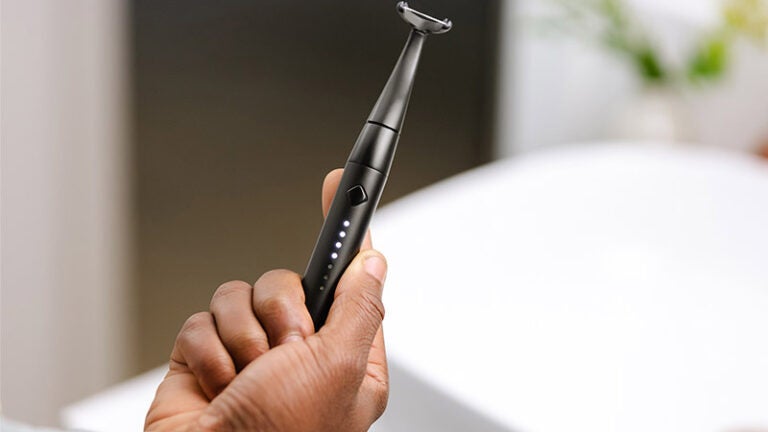
Plastic is overwhelming our world. USC Dornsife students and alumni aim to cut off the strangle-hold
Just when the plastic pollution crisis couldn’t seem to get any worse, a recent study found that microplastics have been found in the human bloodstream.
It’s already been identified in some of the remotest places on Earth, in the placentas of pregnant women, in seafood and in beer. These insidious, microscopic flecks are, of course, the sneakier cousin to larger plastic trash, perhaps best exemplified by the massive floating garbage patches in our oceans.
The world now produces nearly 400 million tons of plastic pollution every year, and each piece takes some 400 years to break down. Less than 10% is recycled.
Clearly, we have a serious problem. But what do we do about it? Plastic protects nearly everything we buy, it’s the building material for home goods, and is essential to industries like health care, in which non-plastic alternatives to vital items such as surgical gloves are hard to imagine.
The seriousness of the challenge isn’t an obstacle for USC Dornsife College of Letters, Arts and Sciences students and alumni, who are determined to find ways out of the plastic quagmire.
A better PVC
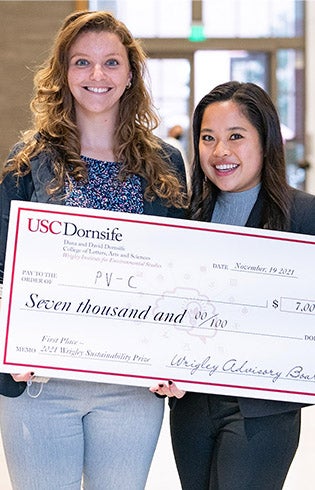
Nancy Bush and Caitlin Dinh co-created PV-C while studying at USC Dornsife. (Photo: Courtesy of USC Wrigley Institute.)
Professor Megan Fieser’s lab is ground zero for students interested in plastic research at USC Dornsife. Fieser, Gabilan Assistant Professor of Chemistry, is currently working on ways to make plastic more biodegradable.
Nancy Bush, a PhD chemistry student, and undergraduate chemistry student Caitlin Dinh met while conducting research at Feiser’s lab and won the 2022 Wrigley Sustainability Prize for their venture “PV-C” (a name meant to convey “PVC” minus the “C”).
PVC is the third most used type of plastic and notoriously difficult to break down. Bush and Dinh developed a way to strip the chlorine from PVC, creating two byproducts: polyethylene, an easily recyclable plastic, and non-toxic chlorine salts. The salts have commercial applications that could reduce the need for chlorine strip mining.
The two women received a $7,000 check with their prize, which they’ll use to further advance their venture.
Don’t floss, Flaus
Inspiration struck Samantha Coxe ’14 after she left her dentist’s office, slightly chastised for not flossing regularly. “I’m very health conscious. I brush two times a day, I drink water, I have a five-star skin care routine, but I was admittedly a horrible flosser,” says Coxe, who graduated from USC Dornsife with a degree in psychology.
Hoping to improve her habits, she searched for some sort of electric flosser similar to her electric toothbrush, but discovered nothing like it on the market. So, she decided to make one herself.
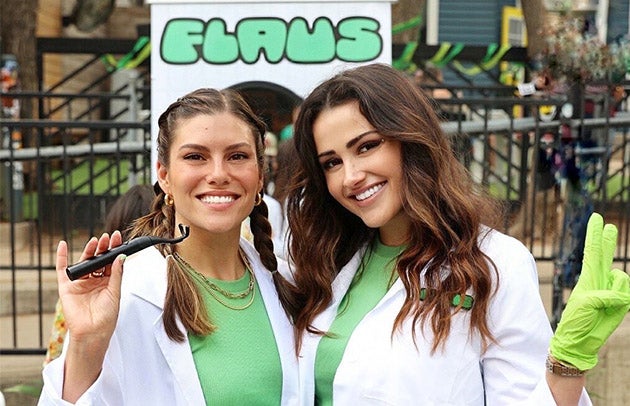
Flaus co-founders Samantha Coxe (right) and Elli Hanson recently won a speed pitch competition at the SXSW conference in Austin, TX (Photo: Courtesy of Samantha Coxe.)
Coxe recruited fellow Trojans Elli Hanson and Taylor Jolin, friends she’d made while an undergraduate at USC, and together they designed Flaus, an electric flosser that is reusable, recyclable and takes just an inch of floss compared to the average 18 or so inches used in a regular flossing session.
They raised nearly $350,000 through crowdfunding for their product and won the USC Marshall Greif Center’s New Venture Seed Competition in 2021. Their flosser will launch this summer through their website, and Coxe hopes it will hit retail shelves in the next few years.
Reducing plastic waste was an important part of the venture from the start.
“The more research we did the more we realized how detrimental floss is to our environment. Floss string and floss sticks have been found in the stomachs of whales and sea turtles,” says Coxe. “That really gave us the passion to make flossing better for both humans and the Earth.”
They’ve baked sustainability into their business model by designating their company a public-benefit corporation, which includes a positive impact on the world as part of its legally defined goals. For each flosser they sell, Flaus makes a donation to Plastic Bank, which funds plastic collection sites in underserviced areas.
Easy, beautiful, Breeze Box
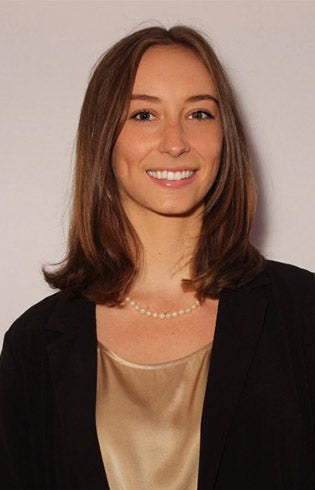
Nicole Summerfield was inspired to create a reusable takeaway container after waitressing during the pandemic. (Photo: Courtesy of Nicole Summerfield.)
The COVID-19 pandemic made takeaway food (and cocktails) enormously popular, but the impact of all those plastic to-go containers is considerable. A recent study found that take-out boxes and cups make up a majority of the plastic litter in our oceans.
Environmental studies student Nicole Summerfield has a potential solution. She got the idea after working as a waitress during the pandemic, watching hundreds of takeaway boxes go out the door each day. Compostable options weren’t much better, as they tended to get soggy or break. They also rarely are composted, often ending up in the landfill anyways.
Her business, Breeze Box, offers reusable to-go containers in a variety of sizes, each with a tracking number. Centralized food vendors, like colleges or hospitals, can deploy thousands of the containers in their cafeterias and cafes. Diners then drop the box off at collecting stations, where they’re cleaned and reused, up to 1,100 times.
Breeze Box’s tracking number allows businesses to monitor use and find out where boxes may have gone missing. At the end of their lifecycle, containers can be broken down into plastic pellets for reuse.
The container is already in Summerfield’s housing, a former sorority house that she shares with 37 other women. They use Breeze Box to distribute the chef-prepared meals that come with their housing plan.
“We had been using Styrofoam boxes, which are the worst. Seeing us stop buying and throwing these away was a really rewarding milestone,” says Summerfield. Breeze Box was a finalist for the 2022 Wrigley Prize, winning a $3,000 award.
Conserving America
New approaches to consumer products and recycling are essential, but there’s still a lot of work to be done on clearing plastic from the environment.
The USC branch of the American Conservation Coalition (ACC) has been tackling this since Fall 2021with regular garbage clean-ups on campus and at beaches and parks around Los Angeles.
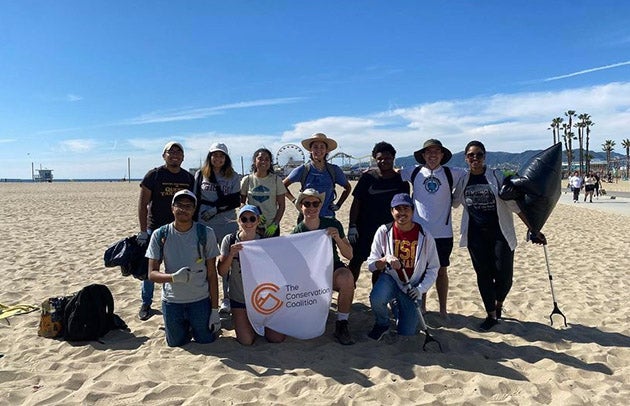
The American Conservation Coalition at USC gathers trash from beaches and campus. (Photo: Courtesy of Adam Jackman.)
Adam Jackman, a junior majoring in political science, founded the branch after interning with U.S. Rep. Young Kim, a USC alumna, in Washington, D.C., through the Dornsife Washington, D.C. Program. Kim frequently partnered with ACC, and Jackman was inspired by their nonpartisan approach to environmentalism.
“A lot of the action against climate change that I’ve seen seemed to be from people on only one side of the political spectrum, but this is an issue that will affect everyone,” says Jackman. “I saw that USC didn’t have a chapter of the ACC, so I thought I could start one and bring people into environmentalism that weren’t there before.”
ACC’s clean-ups consistently gather from 15 to 30 bags of trash. On a recent outing to Santa Monica Beach, Jackman was alarmed by the large number of plastic bottles on the sand and stuck to fences. He arranged for a presentation to the club by WeTap, which educates the public on using tap water instead of buying bottled water.
The club has several events planned for Earth Week, including a clean-up on fraternity row co-sponsored by Beta Theta Pi and a clean-up on Sorrento Beach on April 23.
“We don’t do events where we’re just talking about the problem. We’re going out and using the power we have to make a difference,” says Jackman.